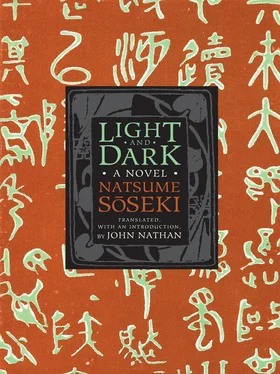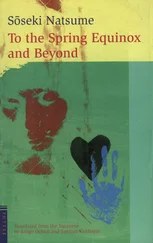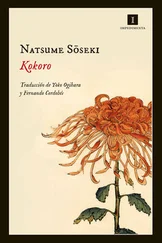“Just briefly—”
“I’m in the middle of something. This isn’t the time.”
“Of course — please forgive the interruption.”
Closing the door as quietly as he could, Tsuda went back to his desk. In the afternoon he returned twice to stand in front of the same door. There was no sign of Yoshikawa either time.
“Has he gone out?”
The question was addressed to the office boy he encountered at the bottom of the stairs on his way out. The youth had perfect eyes and mouth; he was attempting to summon a brown, long-haired dog from where it reclined beneath a stone step by whistling at it as though magically, extending his arm in the animal’s direction.
“He left a while ago with a visitor — he might not be back today.”
Since all day long his sole concern was attending to the comings and goings of the people in the office, the boy’s predictions were apt to be more reliable than Tsuda’s. Leaving behind the brown dog, whose owner was undetermined, and the office boy at pains to make friends with the animal, Tsuda returned yet again to his desk, where he continued working as usual until the end of the day.
When it was time to leave he lagged slightly behind the others as they exited the large building. On the way to his usual trolley stop, as though abruptly recalling something, he took his watch from his vest pocket and glanced at it. It was less the precise time he wanted than a determination of which direction to take. It was very much as if he were conferring meaningfully with the watch whether to stop at Yoshikawa’s house on the way home or abandon the idea.
In the end, he jumped aboard a streetcar that ran in the opposite direction to his own house. He well knew that Yoshikawa was often not at home and didn’t expect that dropping in would guarantee a meeting. He also understood that even if his employer chanced to be there, he might be turned away if his timing happened to be inconvenient. Nevertheless, he felt it was necessary from time to time to pass through Yoshikawa’s gate. This was out of courtesy. It was also an obligation. It was furthermore in his best interest. Finally, it was simple vanity.
Tsuda’s acquaintance with Yoshikawa is privileged .
There were times when he felt like bearing this truth on his back. When he wished to shoulder his burden in plain view of everyone. But without in the least compromising his habitual self-respect. The psychology that had brought him to the entrance to Yoshikawa’s house was akin to that of a man who, even as he secludes things as deeply inside himself as possible, wants to reveal his hiding place to others. His interpretation to himself was that he had come all this way on an errand and for no other reason.
 THE IMPOSING door at the entrance was closed as always. Tsuda glanced carelessly through the thick lattice bars set into the upper half of the door as though carved there. Just inside, a large granite platform waited quietly for shoes. Beyond, a cast-iron lamp shade was suspended from the center of the ceiling. Tsuda, who until now had never once set foot inside this entrance hall, circled to the side of the house and announced himself at the inner entrance immediately adjacent to the student room.*
THE IMPOSING door at the entrance was closed as always. Tsuda glanced carelessly through the thick lattice bars set into the upper half of the door as though carved there. Just inside, a large granite platform waited quietly for shoes. Beyond, a cast-iron lamp shade was suspended from the center of the ceiling. Tsuda, who until now had never once set foot inside this entrance hall, circled to the side of the house and announced himself at the inner entrance immediately adjacent to the student room.*
“He hasn’t returned as yet.”
The houseboy in student hakama who kneeled in front of him answered simply. His attitude, which seemed to suggest an expectation that the visitor would now take his leave, was a little disconcerting. Finally Tsuda followed his first inquiry with a second.
“Is the lady of the house at home?”
“Yes. Mrs. Yoshikawa is here.”
To tell the truth, it was his wife more than Yoshikawa himself with whom Tsuda was on intimate terms. On the way to the house he had been largely animated by a desire for a meeting with her.
“Please let her know I’m here.”
To this new houseboy, seeing him for the first time, he addressed an amended request. The youth withdrew again into the house with what appeared to be equanimity. When he reappeared he said, in a slightly formal tone, “Mrs. Yoshikawa says she will see you if you’ll please follow me,” and led Tsuda to the Western-style drawing room. No sooner had he taken a seat, before tea and a cigarette tray had been brought in, than Yoshikawa’s wife appeared.
“You’re on your way home?”
Tsuda had taken a seat and had to stand again.
“How is your wife doing?” Settling herself into a chair, having responded to his greeting with a mere nod of her head, Madam Yoshikawa asked her second question at once.
Tsuda’s smile was strained. He didn’t know how to reply.
“Now that you’re a married man, we rarely have the pleasure of your company.”
There was no hint of reserve in her voice. She regarded steadily the younger man before her. Younger and, now as before, beneath her in social standing.
“I imagine you’re still happy.”
Tsuda held perfectly still, as though enduring the fine sand kicked up by a wind.
“Although it’s certainly been a while.”
“I suppose — half a year and a little.”
“How time flies! It seems like yesterday — and how is it going these days?”
“How’s what going?”
“How are you getting along with your bride?”
“No complaints in particular—”
“So the honeymoon is already over? I don’t believe it.”
“There never was a honeymoon.”
“Then it’s coming. If you weren’t happy in the beginning then happiness is on the way.”
“Thanks — I’ll be sure to look forward to that.”
“By the way, how old are you?”
“Am I on trial?”
“Of course not. I asked because I want to know. Please give me a straight answer.”
“As you wish — I’m actually thirty.”
“So — thirty-one next year?”
“If things go according to plan, yes.”
“And O-Nobu?”
“Twenty-three.”
“Next year?”
“Now.”
* A student room, usually adjacent to the kitchen, is a room made available to a university student in exchange for houseboy duties.
 YOSHIKAWA’S WIFE often chaffed Tsuda in this manner. When she was in high spirits it was even worse. On occasion Tsuda teased back. However, he perceived occasionally in her attitude the glitter of something neither quite jesting nor serious. In such cases his natural tenacity prompted him to halt in the middle of the conversation. Circumstances permitting, he would attempt to burrow down to the root of what his partner was saying in quest of her true feelings. When the necessity of reserve prevented him from going so far, he stopped talking and closely attended her countenance. At such times his eyes, as an inevitable consequence, appeared to cloud lightly with mistrust. Or perhaps it was cowardice. Or caution. Or perhaps it was light emitted by nerves tensing in self-defense. His eyes also assumed in those moments a hint of what might have been appropriately described as “well-considered anxiety.” Every time Tsuda encountered Madam Yoshikawa, she could be counted on to drive him once or twice into this place. Though he was conscious of being dragged, it happened nonetheless.
YOSHIKAWA’S WIFE often chaffed Tsuda in this manner. When she was in high spirits it was even worse. On occasion Tsuda teased back. However, he perceived occasionally in her attitude the glitter of something neither quite jesting nor serious. In such cases his natural tenacity prompted him to halt in the middle of the conversation. Circumstances permitting, he would attempt to burrow down to the root of what his partner was saying in quest of her true feelings. When the necessity of reserve prevented him from going so far, he stopped talking and closely attended her countenance. At such times his eyes, as an inevitable consequence, appeared to cloud lightly with mistrust. Or perhaps it was cowardice. Or caution. Or perhaps it was light emitted by nerves tensing in self-defense. His eyes also assumed in those moments a hint of what might have been appropriately described as “well-considered anxiety.” Every time Tsuda encountered Madam Yoshikawa, she could be counted on to drive him once or twice into this place. Though he was conscious of being dragged, it happened nonetheless.
“You’re a hateful lady.”
“How so? Is asking your age hateful?”
“It’s how you ask, as if you’re implying something, but you leave your thought unfinished.”
“There’s nothing to finish. Your problem is you’re too thoughtful. Reflection may be essential to a scholar, but it’s taboo in social intercourse. If you could break that habit, you’d be a better man, better liked by others.”
Читать дальше

 THE IMPOSING door at the entrance was closed as always. Tsuda glanced carelessly through the thick lattice bars set into the upper half of the door as though carved there. Just inside, a large granite platform waited quietly for shoes. Beyond, a cast-iron lamp shade was suspended from the center of the ceiling. Tsuda, who until now had never once set foot inside this entrance hall, circled to the side of the house and announced himself at the inner entrance immediately adjacent to the student room.*
THE IMPOSING door at the entrance was closed as always. Tsuda glanced carelessly through the thick lattice bars set into the upper half of the door as though carved there. Just inside, a large granite platform waited quietly for shoes. Beyond, a cast-iron lamp shade was suspended from the center of the ceiling. Tsuda, who until now had never once set foot inside this entrance hall, circled to the side of the house and announced himself at the inner entrance immediately adjacent to the student room.* YOSHIKAWA’S WIFE often chaffed Tsuda in this manner. When she was in high spirits it was even worse. On occasion Tsuda teased back. However, he perceived occasionally in her attitude the glitter of something neither quite jesting nor serious. In such cases his natural tenacity prompted him to halt in the middle of the conversation. Circumstances permitting, he would attempt to burrow down to the root of what his partner was saying in quest of her true feelings. When the necessity of reserve prevented him from going so far, he stopped talking and closely attended her countenance. At such times his eyes, as an inevitable consequence, appeared to cloud lightly with mistrust. Or perhaps it was cowardice. Or caution. Or perhaps it was light emitted by nerves tensing in self-defense. His eyes also assumed in those moments a hint of what might have been appropriately described as “well-considered anxiety.” Every time Tsuda encountered Madam Yoshikawa, she could be counted on to drive him once or twice into this place. Though he was conscious of being dragged, it happened nonetheless.
YOSHIKAWA’S WIFE often chaffed Tsuda in this manner. When she was in high spirits it was even worse. On occasion Tsuda teased back. However, he perceived occasionally in her attitude the glitter of something neither quite jesting nor serious. In such cases his natural tenacity prompted him to halt in the middle of the conversation. Circumstances permitting, he would attempt to burrow down to the root of what his partner was saying in quest of her true feelings. When the necessity of reserve prevented him from going so far, he stopped talking and closely attended her countenance. At such times his eyes, as an inevitable consequence, appeared to cloud lightly with mistrust. Or perhaps it was cowardice. Or caution. Or perhaps it was light emitted by nerves tensing in self-defense. His eyes also assumed in those moments a hint of what might have been appropriately described as “well-considered anxiety.” Every time Tsuda encountered Madam Yoshikawa, she could be counted on to drive him once or twice into this place. Though he was conscious of being dragged, it happened nonetheless.









